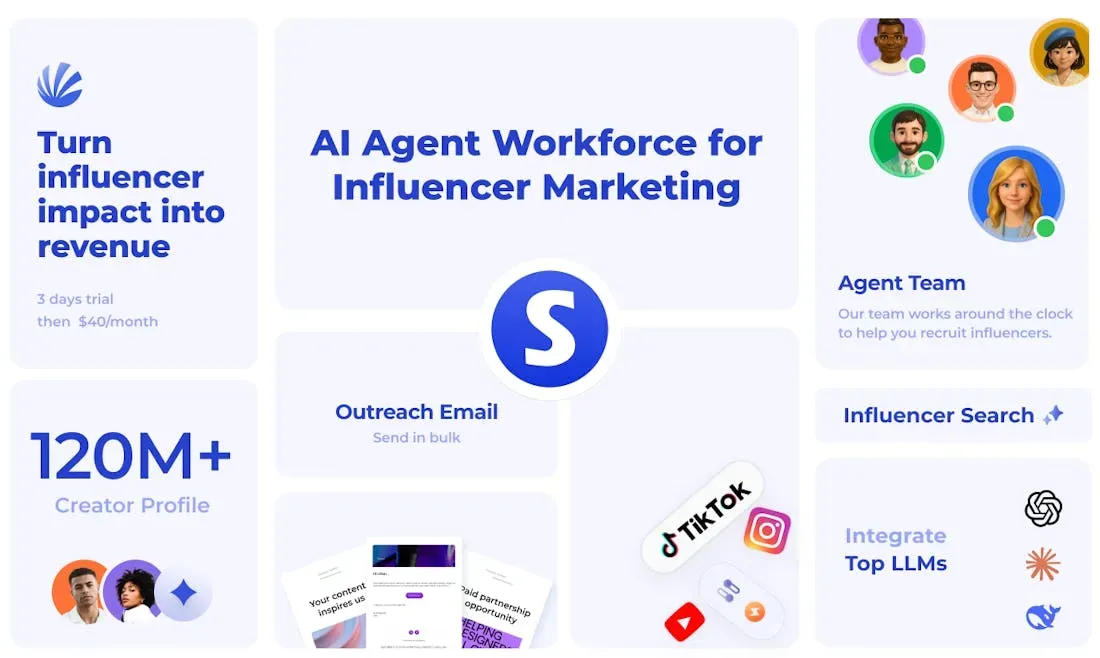In 2026, email marketing automation is the lifeline of small business growth. With 76% of companies now using automation to eliminate repetitive tasks, the competitive gap is widening. Automated emails not only save time but generate 320% more revenue than non-automated emails on average.
For small business owners, the challenge isn't finding a tool—it's finding the right tool. Modern platforms now include AI writing assistants, predictive analytics, and seamless CRM integrations. Whether you need a simple newsletter builder or a complex sales funnel, this guide reviews the top contenders to help you scale efficiently.
The Top 8 Email Marketing Automation Tool Contenders
1. Scrumball

Best For: Influencer outreach, cold email automation, and partnership management.
While traditional tools manage newsletters, Scrumball revolutionizes outbound marketing automation. It is designed for brands that need to build relationships, not just blast lists. Its AI agent, Charlie, handles the entire email lifecycle: generating hyper-personalized pitches, scheduling automated follow-ups, and tracking open rates.
In 2026, where "authenticity" is king, Scrumball's ability to automate 1:1 personal emails at scale makes it indispensable for modern marketing teams.
- Pros: AI-driven writing and personalization, automated follow-up sequences, integrated 120M+ influencer database, multi-language templates.
- Cons: Designed for outreach and relationships, not for mass e-commerce newsletters.
- Pricing: Generous Free Plan available; Starter plan begins at $32/mo.
2. Mailchimp
Best For: Beginners and local businesses.
Mailchimp remains the household name. Its 2026 updates have focused heavily on Generative AI, helping users create text and image content instantly. The "Customer Journey Builder" is visual and intuitive, allowing you to map out complex triggers (like birthdays or tag updates) easily.
- Pros: Massive integration library (Shopify, Canva, etc.), user-friendly.
- Cons: Pricing gets steep quickly; the free plan is very limited.
- Pricing: Free up to 500 contacts; Paid plans start ~$13/mo.
3. ActiveCampaign
Best For: Advanced automation and B2B.
ActiveCampaign is the gold standard for "If/Then" logic. It is more than an email tool; it is a customer experience platform. You can trigger emails based on website visits, sales pipeline stages, or even SMS replies.
- Pros: Incredible segmentation power, built-in CRM.
- Cons: Steep learning curve; interface can feel cluttered.
- Pricing: Starts ~$29/mo (Lite plan).
4. HubSpot Marketing Hub
Best For: Scaling businesses needing an all-in-one suite.
HubSpot connects your email marketing directly to your sales CRM. This means your sales team can see exactly which emails a lead opened before calling them. In 2026, their Breeze AI agents help automate content creation and reporting.
- Pros: Seamless Sales/Marketing alignment, free CRM included.
- Cons: Enterprise tiers are very expensive ($800+/mo).
- Pricing: Generous Free tools; Starter plans begin at ~$15/mo per seat.
5. Brevo (formerly Sendinblue)
Best For: Budget-conscious brands and transactional emails.
Brevo charges by email volume, not contact count. This is a game-changer for businesses with large lists but low sending frequency. It also includes SMS and WhatsApp marketing in the same workflow.
- Pros: Unlimited contacts on all plans, built-in SMS.
- Cons: Template builder is less flexible than competitors.
- Pricing: Free (300 emails/day); Starter ~$25/mo.
6. Klaviyo
Best For: E-commerce (Shopify/WooCommerce).
If you sell products online, Klaviyo is non-negotiable. Its deep integration with Shopify allows you to trigger emails based on specific SKUs purchased, total cart value, or predicted next purchase date. Its ROI reporting is best-in-class.
- Pros: Revenue-focused analytics, pre-built e-commerce flows.
- Cons: Expensive compared to generalist tools.
- Pricing: Free up to 250 contacts; Paid starts ~$20/mo.
7. MailerLite
Best For: Solopreneurs and creators.
MailerLite lives up to its name—it is lightweight, fast, and clean. It recently added a website builder and paid newsletter subscriptions (similar to Substack), making it a favorite for content creators.
- Pros: Beautiful UI, excellent free plan, easy landing pages.
- Cons: Approval process for new accounts can be strict.
- Pricing: Free up to 1,000 subscribers; Paid starts ~$10/mo.
8. Constant Contact
Best For: Event organizers and non-profits.
Constant Contact focuses on simplicity. It has excellent features for managing event RSVPs and donations directly via email. Their customer support (phone support included) is rated highly for less tech-savvy users.
- Pros: Great event tools, phone support.
- Cons: Automation features are basic compared to ActiveCampaign.
- Pricing: Starts ~$12/mo.
How to Choose the Right Email Marketing Automation Tool in 2026?
The "best" tool depends entirely on your business model. Here are the four critical factors to evaluate before committing to a subscription.
1. Affordability & Pricing Models
Budget is paramount. Many platforms offer "Freemium" models, but the costs can spike as your list grows.
- Free Tiers: Mailchimp (500 contacts), Brevo (300 emails/day).
- Low-Cost Leaders: Zoho Campaigns starts at roughly $5/month, while EmailOctopus remains a budget favorite.
Warning: Watch out for "contact-based" pricing. If you have 10,000 subscribers but only email 1,000 of them, you still pay for all 10,000 on many platforms.
2. Ease of Use (The "No-Code" Standard)
You shouldn't need a developer to send a newsletter. In 2026, drag-and-drop editors are standard. Look for platforms that offer pre-built Automation Recipes (e.g., "Welcome Series" or "Abandoned Cart") that you can activate in one click. Tools like MailerLite and ConvertKit excel here.
3. Advanced Features (AI & Segmentation)
Basic autoresponders are no longer enough.
- Hyper-Segmentation: Can you tag users based on what link they clicked?
- AI Writing: Does the tool help you write subject lines or generate images?
- Predictive Sending: Can it automatically send the email when the user is most likely to open it?
4. Scalability
Migrating email platforms is a nightmare. Choose a tool that grows with you. Deliverability rates often drop if you scale too fast on a cheap shared IP address. Platforms like Scrumball, HubSpot, and ActiveCampaign are built to handle millions of contacts without breaking a sweat.
Quick Comparison (2026 Pricing)
| Tool | Best For | Free Plan? | Starting Price |
|---|---|---|---|
| Scrumball | Outreach & Relationships | Yes (Full DB Access) | $32/mo |
| Mailchimp | General / Beginners | Yes (500 contacts) | $13/mo |
| ActiveCampaign | Advanced Automation | No (Trial only) | $29/mo |
| HubSpot | All-in-One CRM | Yes | $15/mo |
| Brevo | Budget / SMS | Yes (300/day) | $25/mo |
| Klaviyo | E-Commerce | Yes (250 contacts) | $20/mo |
| MailerLite | Creators | Yes (1,000 contacts) | $10/mo |
Strategic Tips for Success
1. Define Your Goal: Outreach vs. Nurture
Are you trying to reach new partners (influencers, B2B leads) or nurture existing subscribers? If it's the former, tools like Scrumball are essential for automating the "hello." If it's the latter, tools like Mailchimp are better suited for newsletters.
2. Start with a Clean List
Don't migrate bad data. Before moving to a new tool, use a service like NeverBounce to clean your list. Most automation platforms charge based on active contacts—deleting inactive users saves you money instantly.
3. Prioritize "Time to Value"
How long does it take to send your first campaign? Tools like MailerLite allow you to go live in minutes. Enterprise tools like Salesforce Marketing Cloud might take weeks of setup. For small businesses, speed is a feature.
4. Test Support Channels
When your automation breaks on Black Friday, you need help now. Before buying, test their live chat. Do they respond in 2 minutes or 2 days? HubSpot and Constant Contact are famous for superior support.
Conclusion
Choosing the right email marketing tool in 2026 comes down to your specific business model. If you are focused on building partnerships and cold outreach, Scrumball is the undisputed leader. For e-commerce, Klaviyo wins. For general newsletters, MailerLite offers the best value. Use the free trials to test the workflow—the best tool is the one you actually enjoy using.
FAQ
What is the easiest email marketing tool for beginners?
Scrumball is the easiest for automated outreach due to its AI agents, while MailerLite is widely considered the most user-friendly for designing newsletters. Both use drag-and-drop interfaces to remove technical barriers.
Is email marketing still effective in 2026?
Yes. Email marketing has an average ROI of $36 for every $1 spent, higher than any other channel. Unlike social media algorithms, you own your email list, making it the most reliable way to reach customers.
Can I switch platforms later?
Yes, but it can be painful. Migrating lists, recreating templates, and re-warming your IP address takes time. It is better to choose a platform that can scale with you for at least 1-2 years.
Does Google Gmail or Yahoo Mail block marketing emails?
They can if you don't follow best practices. In 2024, Google and Yahoo introduced stricter requirements for bulk senders (DMARC authentication). Ensure your chosen platform handles these technical setups for you.



